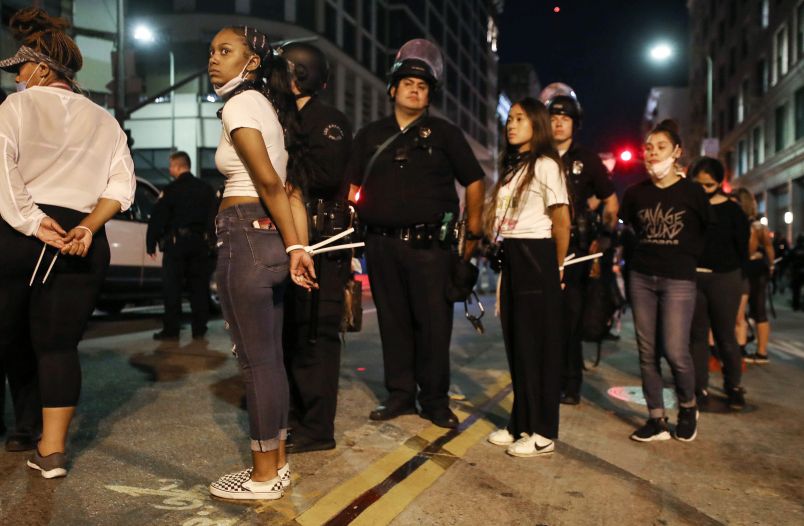The Drug Enforcement Administration on Sunday reportedly received approval to “conduct covert surveillance” and act as federal law enforcement in the ongoing protests over the death of George Floyd.
The DEA would typically be limited to enforcing federal drug laws, but a memo from the agency approved by a Justice Department official, and then obtained by BuzzFeed News on Tuesday, allows it to go much further on a temporary basis.
“[I]n order for DEA to assist to the maximum extent possible in the federal law enforcement response to protests which devolve into violations of federal law, DEA requests that it be designated to enforce any federal crime committed as a result of the protests over the death of George Floyd,” the memo, written by acting DEA administrator Timothy Shea, read.
The authorization, according to the memo, covers covert surveillance, intelligence sharing with federal and local counterparts, the ability to “intervene as Federal law enforcement officers” at protests and “investigative and enforcement activity” for violations of federal law.
The authorization is nationwide and lasts 14 days, according to the memo.
Shea is a close confidant of Attorney General Bill Barr, and before Shea’s recent appointment to fill in at the DEA last month, he was the interim U.S. Attorney for the District of Columbia.
It wasn’t immediately clear Wednesday why the DEA’s resources were necessary to police the ongoing, nationwide protests against racism and police brutality in the wake of Floyd’s death. The DEA did not return TPM’s request for comment, and declined BuzzFeed’s request.
The governor of Minnesota, Tim Walz, said in an early morning press conference Saturday that “the cartels, who are wondering if there was a break in their drug transmissions, are trying to take advantage of the chaos.”
“That’s why this situation is on a federal level,” Walz commented. A spokesperson for the governor did not reply to TPM’s request for comment.
Later Saturday, without providing evidence, Barr blamed rioting in several cities on “anarchistic and far left extremists, using Antifa-like tactics, many of whom travel from out of state to promote the violence.” The DEA and other Justice Department agencies would be deployed to support local efforts, he said.
And President Donald Trump has summoned an alphabet soup of law enforcement and military resources to Washington, D.C. to police the protests there. On Monday, he said he was “mobilizing all federal resources — civilian and military” to enforce the law nationwide.
Shea’s new, expanded law enforcement and surveillance powers at DEA follow a long line of service under Barr, with whom he’s been close for years.
Prior to his previous role as acting U.S. attorney, Shea was a counselor to Barr, which included advising the attorney general on matters relating to the Bureau of Prisons following the death of sex trafficker Jeffrey Epstein in government custody.
In the early ’90s, Shea served as associate deputy attorney general, overlapping with Barr’s first tenure as attorney general in former President George H.W. Bush’s administration.
Shea’s tenure as D.C.’s U.S. attorney was marked by turmoil, most prominently when he signed off on the motion to drop charges against former National Security Adviser Michael Flynn. He also reportedly reorganized most of the office’s criminal division.
Shea replaced the Jessie Liu in the U.S. attorney’s seat shortly after Liu’s office closed the years-long case involving former FBI director Andrew McCabe without filing any charges — reportedly enraging the President. Liu left the post under unusual circumstances.
“[Shea] was willing to bend to the pressure of Barr, who was very interested in intervening in cases,” Barb McQuade, former U.S. Attorney for the Eastern District of Michigan, told TPM as Shea left the office last month.



